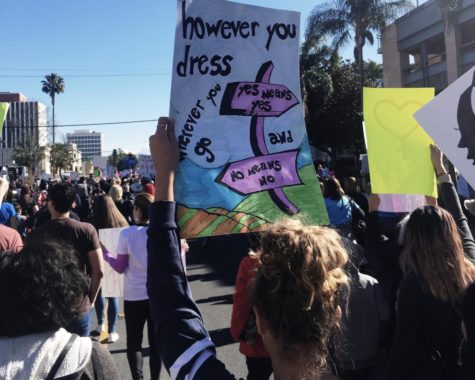
By: Savi Raghuraman | Student Life Editor
March 23, 2018
In October of last year, the Harvey Weinstein scandal shook Hollywood to its core, spurring survivors of sexual assault and harassment to come together to demonstrate the prevalence of these problematic and damaging experiences through the groundbreaking #MeToo movement. Yet #MeToo only exposes the magnitude of the sexual misconduct issue. It’s nothing more than a platform on which to actively work towards societal reform and an end to rape culture. Today, 5 months after the start of the #MeToo phenomenon, what progress have we made beyond mere recognition of the problem?
Macy Smith, junior, reflects that the #MeToo movement allowed survivors to “create their own language with in which to talk about sexual assault,” as well as “to communicate their experiences and initiate social, political, and legislative change.” In this way, the hashtag has created an online community of support and unity among survivors of sexual assault and harassment.
In addition, a number of men have been ousted from seats of power, or at least have moved on with severely damaged reputations, after sexual harassment or assault allegations have been publicized. Weinstein was the first. A slew of other male figures in entertainment followed, as well as some accused in the fields of media, business, technology, music, sports, and politics. Senator Al Franken was forced to resign, and Roy Moore, previously assured the Alabama Senate seat, lost to his Democratic opponent because of the force of #MeToo. Still, the tirade of justice seekers seems to have exempted certain people from its wrath. Donald Trump’s treatment of women is well-known and backed up with evidence, yet he remains in the Oval Office, practically untouched.
All men in power are now looked at with a new scrutiny that makes many uncomfortable and a few angry. Any sudden cultural shift encounters resistance. Given that fact, the #MeToo movement has accomplished a surprising amount in these 5 months, but it has a long way to go. After all, beyond bringing justice to those guilty of sexual misconduct, the eventual goal is for our generation and future generations to not need to say “Me too.” To reach this point, we as Americans need to do more than expose and punish wrongdoing; we need to prevent it.
To accomplish this goal, Emily Eberhart, junior, believes “it’s in our best interests to end the divide between genders. We can work together to create a shift in our culture and to eliminate the sexism and misogyny that is so deeply ingrained in our society.” She adds that, specifically, “men can help protect women from sexual predators and women can encourage men to not feel emasculated if they stand up to their peers.”
Rape culture has no easy fix. #MeToo starts the process of finding solutions by challenging the stigma around discussing sexual misconduct, but furthering our progress will require our society to actively rid itself of some deeply-rooted standards concerning gender and sexuality, as well as promoting and enforcing a higher level of respect for others in and out of the workplace.
Let’s not forget #MeToo’s other message: women can and will speak out powerfully. The movement was begun by women, and women will continue to drive the necessary shift in cultural attitudes, not because we should be the ones responsible for changing the behavior of men, but because we care enough to try.

Well written piece on a huge subject and a potentially transformatory one for a new generation all over our planet. But it seems such evolutions in gender roles take longer than expected no matter how much attention is on the subject from members in the media and in the general population. I hope I am wrong.